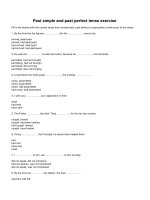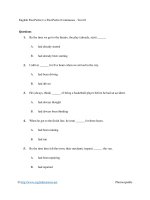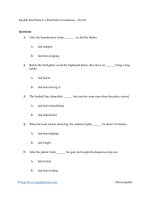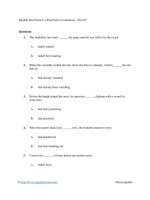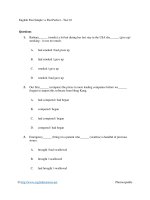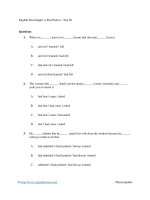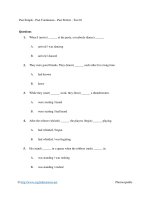simple past vs simple continuous. simple past vs past perfect
Bạn đang xem bản rút gọn của tài liệu. Xem và tải ngay bản đầy đủ của tài liệu tại đây (62.51 KB, 3 trang )
UNIT 3: THE PAST SIMPLE AND THE PAST CONTINUOUS
THE PAST SIMPLE AND THE PAST PERFECT
I.
II.
Complete the sentences using the correct tense of the verb:
1. Yesterday at six I (prepare)................. dinner
2. The kids (play) ....................... in the garden when he
(come)...............
3. I (practise).......................... the guitar when she (come)....................
4. At this time yesterday we (play) .......................... tennis
5. I (watch) ......................... tv when the phone ...................... (ring)
6. Keith (have)................................ a bath when the
detective ................... (arrive)
7. Alberto ........................... (break) a leg when he.................... (ski)
8. Last night Lily (listen) ......................... to the radio when
she................. (hear) a strange noise downstairs.
9. Jim ............... (fall) out of the tree while he ................. (climb) it.
10.We ....................... (give) Kate first aid when the
ambulance.......................... (arrive).
11.While I ...................... (wait), I .......................... (notice) an old man
lying the ground.
12.Rachel ........................ (decide) not to go out, because
it .................... (rain)
13.The thief ........................... (steal) my purse while I ..........................
(look) at the shop.
14.The other day Heidi .......................... (cross) the road when
suddently a car ............................ (crash) into a lamp-post in front
of her.
15.Marry ....................... (water) the flowers at 3.00pm yesterday.
16.At this time last year we (learn)............................ Englis in London.
17.When I (phone) ................... my friends, they ...................................
(play) cards.
18.She (do)......................... her work at this time yesterday.
19.Peter and I (do) ........................the exercise at this time last night.
20.Yesterday while my father (watch) ....................tv, my mother(read)
.............................. the newspaper, my sister (do).............. her
homework and I (play) ...................... chess with my friend.
Put the verbs in the brackets in correct tense:
1. Almost everybody (leave)…………………………. by the time we
(arrive)…………………………..
2. He (wonder)…………………………. whether he (leave)
…………………………. his wallet at home.
3. The secretary (not leave)…………………………. until she (finish)
…………………………. her work.
4. The couple scarcely (enter)…………………………. the house when they
(begin)…………………………. to argue.
5. The teacher (ask)…………………………. the boy why he (not do)
…………………………. his homework.
6. She already (post)…………………………. the letter when she (realize)
…………………………. she (send)…………………………. it to the
wrong address.
7. Hardly the car (go)…………………………. a mile when it (have)
…………………………. a flat tyre.
8. The weather (be)…………………………. far worse than we (expect)
…………………………..
9. They (be married)…………………………. for five years when thy
finally (have)…………………………. a child.
10.No sooner they (sell)…………………………. their car than they (regret)
…………………………. having done so.
11.When she (finish)…………………………. her work she (go)
…………………………. to the cinema.
12.He (not eat)…………………………. until his parents (come)
…………………………. home.
13.She (tell)…………………………. she never (meet)
…………………………. him
14.He (do)…………………………. her homework before he ( go)
…………………………. out.
15.The lights (go)…………………………. out the moment he (get)
…………………………. into the cinema.
16.Hardly the holiday (begin)…………………………. when they (leave)
…………………………. the town.
17.They (be)…………………………. out for an hour when it (start)
…………………………. to rain.
18.They (leave)…………………………. the shop as soon as they (buy)
…………………………. everything they (need)
…………………………..
19.The house (burn)…………………………. to the ground buy the time the
firemen (arrive)…………………………..
20.As he (do)…………………………. a lot of work that day he (be)
…………………………. very tired.
21.I already (hear)…………………………. about the accident when he (tell)
…………………………. me about it.
22.He (live)…………………………. in the country for ten years when he
first (come)…………………………. to London.
23.I (not talk)……………..........to him because when I (arrive)
…………………………. he already (leave)…………………………..
24.When we (go)…………………………. out again, the wind (stop)
…………………………..
25.No sooner the bell (ring)…………………………. when the pupils (go)
…………………………. out to play.
26.The same day he (arrive)…………………………. I (receive)
…………………………. a postcard from him.
27.They just (close)…………………………. the shop when I (get)
…………………………. there.
28.I knew I recognized the town square. I ................................ (be) there
before.
29.After Rischard ......................... (finish) work, he........................ (go)
home.
30.Susan no longer owned a bike. She ..................... (sell) it.
III. Write full sentences based on the words given:
1. Before / she/ do/ the shopping/ she/ visit/ her neighbors
.......................................................................................................
2. At this time yesterday/ he/ do/ homework.
.........................................................................................................
3. He/ have/ his breakefast/ when/ police/ come.
............................................................................................................
4. When/ the programme/ finish/ he/ switch/ the tv off
............................................................................................................
5. After/ he/ do/ his homework/ he / go out.

